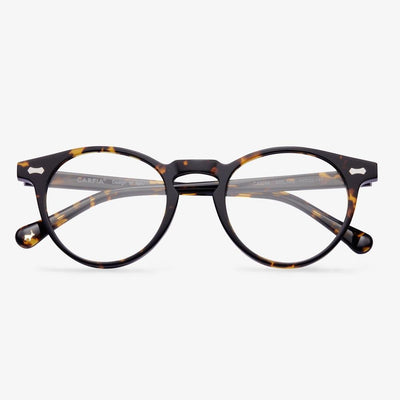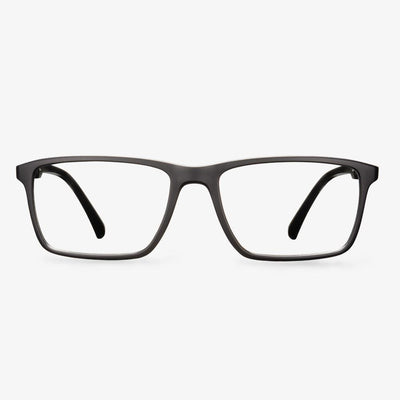Transitions® Photochromic Lenses
When you step outside, it immediately begins to darken. The lenses help prevent harmful blue light from digital devices, screens, and sunlight to help reduce glare and prevent eye strain. They have the function of 100% UV blocking,anti-reflection treatment with blue light protection. They can constantly adapt to changing daylight conditions to reduce excess light and optimize color contrast and polarized light to prevent dazzle. They filter out excess light to provide maximum comfort. And provide high contrast and minimize glare. They provide increased color recognition and depth perception.
How to Keep Glasses from Slipping
Stick-on Nose Pads
Nose pads would be a good choice to prevent glasses to slide down your nose. Hence, you can stick a pair of rubber pieces in the nose pads of your glasses or you can choose a pair of glasses with rubberized nose pads. If you want to try a pair of nose pads glasses, the Koalaeye Optical may be a good choice. The rubber nose pads will make you feel steadier and better and the additional resistance on the nose pad will surely provide more support. So, if your glasses often slip down from your nose, try this way.
Wax Coating
To keep glasses from slipping, you can try wax coating which is a smart move. Use the wax on your nose pad area along with the temple where the glasses come into contact with the skin. In general, it works fine and it is nearly invisible.
Temple Ear Hook
The temple ear hook is a good way to keep glasses from slipping. It can provide mechanical support behind the ear and you will feel the support from the back of your ears. But the drawback of the temple ear hook is that it is quite visible. When you take off the lenses, you need to lift the temple higher so that the ear hook could clear the ear’s crest. Besides, the cheaper one might cause some discomfort to the back of your ears because of the pressure.
Rubber Bands and Hair Ties
To keep glasses from slipping, you can also try hair ties and rubber bands. You can tie one around the temple tip behind your ear so that it can provide both slight mechanical support and friction forbidding your glasses from moving around. What’s more, this is a low-cost method.
Select qualified optical lenses.
Anti-blue light lens must be qualified optical lens first and must have a certain percentage of anti-blue light effect. The general anti-blue light optical lens effect is about 30%. Even if it is not nearsighted people, it is best to choose the brand lens of reliable optical lens production enterprises. Anti-blue light lens is only suitable for people who use electronic display devices such as computers for a long time and is not suitable for patients with visual fatigue symptoms.
Can clear lenses be polarized?
At present, there are no clear polarized lenses. A polarized lens is a thin film vertically arranged with silicon crystal coating placed inside the lens, just like a shutter, which covers the parallel light and only allows the vertical light to pass through. In this way, the glare from all directions can be eliminated, so it is clear and comfortable to wear. Transparent polyamide, the material of nylon lens, is a new variety of polyamide. The material of the nylon lens is mainly transparent polyamide. Due to the effect of the light filter, only light from a specific direction is allowed to pass through the lens, which filters the dazzling light from the sun on the water, land, or snow very well. It can not only make the landscape soft, clear, and natural but protect the eyes to a certain extent.
Method of taking off the contact lens
Wash your hands before removing contact lenses, and be careful not to leave long fingernails, to avoid contamination of the lenses by bacteria and nail scratches. Look up, open the upper and lower eyelids with the left index finger and right middle finger. Pinch the middle and lower edge of the lens gently with the thumb and index finger of the right hand, and remove the lens. You can use the index finger first to move the lens down, and then gently pinch the middle and lower edge of the lens with the thumb and index finger belly, and take off the lens.
How to Know If You Need Bifocal Glasses?
As you get older, you will find that is more and more difficult to read or focus on things that are really close up. This is called presbyopia and it is a common eye condition among older people.
How to know if you need bifocal glasses? If you find yourself squinting at the text that once was easy to read or your vision is blurry, you may need to see an eye doctor. In this situation, you may need bifocal glasses to correct your eyes.
If you currently wear glasses but see print more clearly when you remove them, it is a sign that you may need bifocal glasses in the future.
To know if you need bifocal glasses exactly, check your eyes by an optometrist or ophthalmologist.
Many optometrists have problems adjusting their frames almost daily. In the eyes of the customer, it is simple to use tools, but in reality, the technology involved is pretty important. It is no exaggeration to say that a good pair of glasses and optometry, collocation is equally important. If the customer's optometry parameters are normal, and glasses collocation is accurate, but wearing is not comfortable. So the collocation of glasses is very key, and many problems can be solved by the collocation of glasses.











































